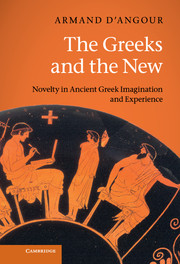Book contents
- Frontmatter
- Contents
- Acknowledgements
- Introduction
- Chapter 1 New, new, new
- Chapter 2 Loosening the grip of the past
- Chapter 3 The transformations of Kaineus
- Chapter 4 Old and new
- Chapter 5 Nothing new under the sun
- Chapter 6 The birth of Athena
- Chapter 7 Inventions of Eris
- Chapter 8 The newest song
- Chapter 9 Constructions of novelty
- Chapter 10 So what's new?
- References
- General index
- Index of Greek terms
- Index locorum
- References
Chapter 8 - The newest song
Published online by Cambridge University Press: 07 September 2011
- Frontmatter
- Contents
- Acknowledgements
- Introduction
- Chapter 1 New, new, new
- Chapter 2 Loosening the grip of the past
- Chapter 3 The transformations of Kaineus
- Chapter 4 Old and new
- Chapter 5 Nothing new under the sun
- Chapter 6 The birth of Athena
- Chapter 7 Inventions of Eris
- Chapter 8 The newest song
- Chapter 9 Constructions of novelty
- Chapter 10 So what's new?
- References
- General index
- Index of Greek terms
- Index locorum
- References
Summary
I feel free to cleave the ether on a new-found path to novel spheres of pure activity.
Goethe, Faust, Part IMousikē provides the most explicit and enduring examples of innovationist discourse in any sphere of Greek cultural activity. The significance and function of that discourse vary, reflecting both the variety of the domain of mousikē and the different ways things can be called ‘new’. The rhetoric of innovation often elides such distinctions, intentionally or otherwise; but the mass of verbal indications of innovationism in Greek musico-poetic texts, combined with the ubiquity and popularity of Greek musical activity, leaves little room for doubt that the idea of the new played a vital role.
Testimony to the place of novelty in music begins with the songs of Homer. In the first book of the Odyssey, Homer depicts the bard Phemios entertaining suitors in Odysseus’ palace with a song about the return of the heroes from Troy (nostos Akhaiōn). The song distresses Penelope, who bursts into tears and asks the minstrel to change his tune:
Phemios, you know many other pieces to enchant mortals,
deeds of men and gods that bards celebrate (kleiousi) in song.
Sing one of those as you sit among these men, and let them
drink their wine in peace. But stop singing this
distressing song – it always breaks my heart,
since I, more than any, am constantly racked by grief.
I pine for my dear husband and am constantly reminded
of him, whose fame (kleos) is wide throughout Hellas and in the heart of Argos.
Telemakhos intervenes:
Don't scold Phemios for singing of the Danaans’ tragic fate:
People give greater acclaim (epikleiousi) to the newest (neōtatē) song that attends their ears.
Telemakhos’ forthright statement makes him ‘the poet's spokesman in his plea for artistic freedom and his emphasis on the importance of poetic novelty’.
- Type
- Chapter
- Information
- The Greeks and the NewNovelty in Ancient Greek Imagination and Experience, pp. 184 - 206Publisher: Cambridge University PressPrint publication year: 2011

